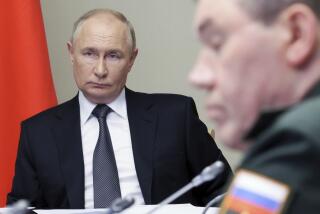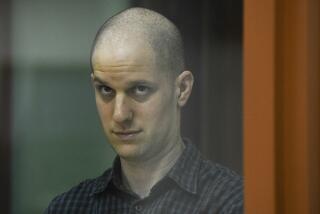Gorbachev’s Travel Limited Until He Testifies
MOSCOW — In the most shocking sign yet of how far his stature has plummeted in his homeland, former Soviet President Mikhail S. Gorbachev was legally barred Friday from leaving Russia until he agrees to testify in the “trial” of the Communist Party.
The press service of the Russian Constitutional Court said the ban was imposed by the Foreign and Security ministries, which “informed the court that they have taken measures to prevent Gorbachev from leaving Russian territory until he fulfills his civic duty.”
A Foreign Ministry official contacted by telephone said Gorbachev’s passport was being “withheld.”
As recently as Tuesday, an angry Gorbachev refused to appear at the controversial court hearing, which is assessing both the legality of the Communist Party’s role in Soviet history and Russian President Boris N. Yeltsin’s decision last year to outlaw it. Gorbachev was the party’s general secretary in 1985-91.
Alexander A. Likhotal, a Gorbachev spokesman, said Friday evening that the former Soviet president had not yet been officially informed of the humiliating restrictions on his movements, which were imposed at the court’s request. “We don’t know what sort of measures may be taken,” Likhotal said.
Gorbachev, 61, and his wife, Raisa, had been scheduled to leave Moscow for a visit to South Korea next Tuesday, Likhotal said. In mid-month, the former Soviet first couple planned to travel to Italy.
Unlike the vast majority of Russians, Gorbachev has a so-called diplomatic passport, meaning he does not need to request an exit visa from the Interior Ministry every time he wants to go abroad.
The passport, however, is in the hands of the Foreign Ministry, Likhotal said.
“The last time we talked, they told us that the Korean visas had been granted but that the relevant services of the Foreign Ministry had not received an ‘OK’ from above,” Likhotal said.
“That may mean in practice that his diplomatic passport has been impounded,” Likhotal added.
Gorbachev has been protesting that his appearance before the 13-judge tribunal would lend credence to a trial he claims is a politicized “circus.”
“It’s not a Constitutional Court,” Gorbachev told reporters Tuesday. “They need a brawl to distract attention from the problems confronting Russia and the Commonwealth. . . . I can’t be an accessory to continuing this farce, which my testimony would have implied.”
On Thursday, the judges insisted on their power to summon Gorbachev as a witness and retained the right, if the former Kremlin leader continued to refuse, to use “all constitutional and legal means.”
Earlier, the court had merely “invited” Gorbachev to attend.
“Trouble is coming,” court Chairman Valery Zorkin said. “If representatives of the most active part of the population are that disrespectful of the Constitution and the Constitutional Court, it means the death of Russia.”
In some respects, the year-old court seems to be inventing its rules of procedure as it goes along. In June, when the trial began, Zorkin said that because the case was not a criminal one, the court could not compel people to appear.
And earlier this week, officers of the court said that the worst that could befall the recalcitrant Gorbachev was a 100-ruble fine--a sum worth about 30 cents.
Gorbachev, who resigned as head of the Communist Party after many of its top leaders connived in the August, 1991, plot aimed at deposing him, has charged that the investigation of the Communist Party’s acts is being stage-managed by the entourage of his old political rival, Yeltsin.
This week, Gorbachev said he would refuse to testify “even if handcuffed.”
Gorbachev also cannot count on the sympathy of many of his old Communist comrades, who want the court to declare Yeltsin’s banning of the party unconstitutional.
Many hard-line Communists want to see Gorbachev brought into the dock and forced to take ultimate responsibility for unsavory deeds committed during his tenure as general secretary--actions such as the alleged Kremlin bankrolling of international terrorism and the violent Soviet crackdowns on nationalist ferment in Georgia, Lithuania and other republics.
More to Read
Sign up for Essential California
The most important California stories and recommendations in your inbox every morning.
You may occasionally receive promotional content from the Los Angeles Times.










